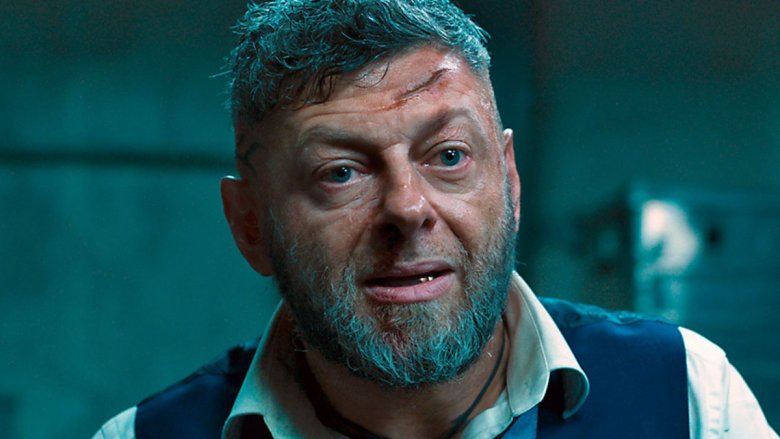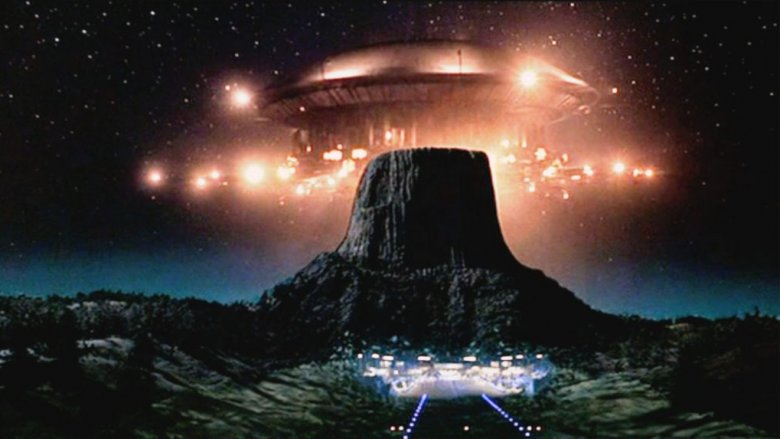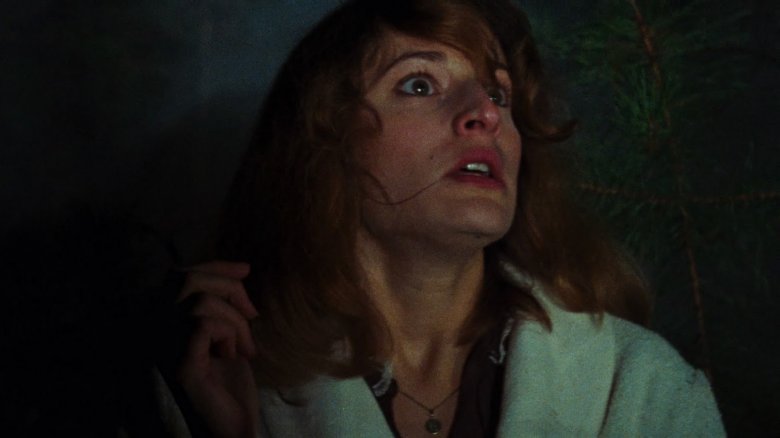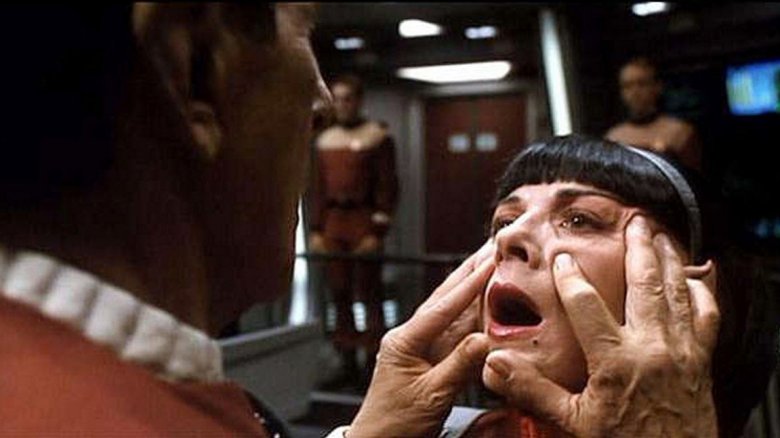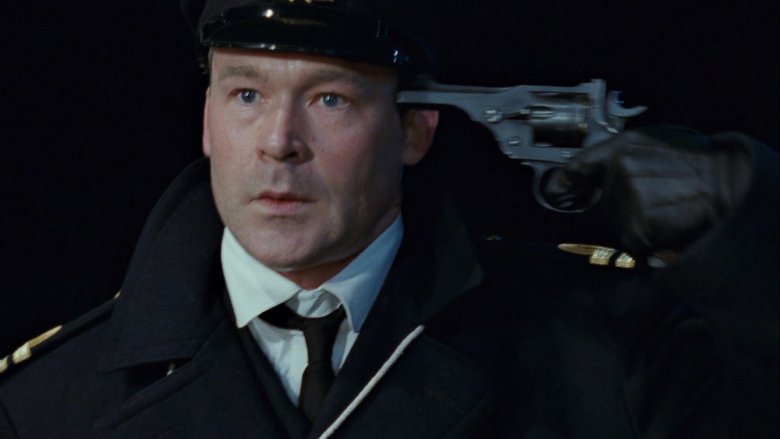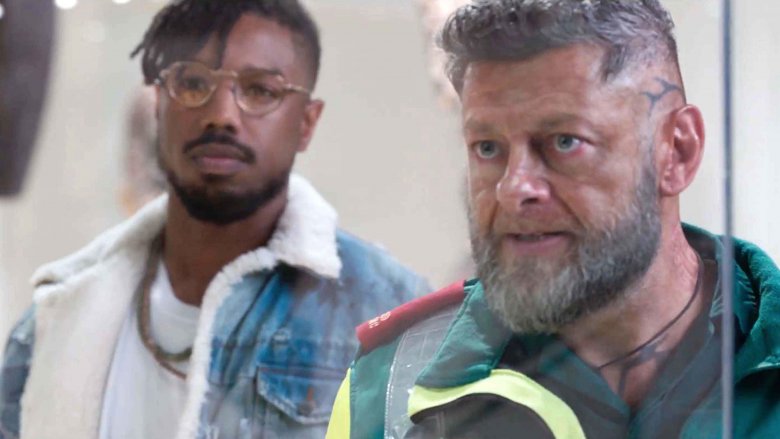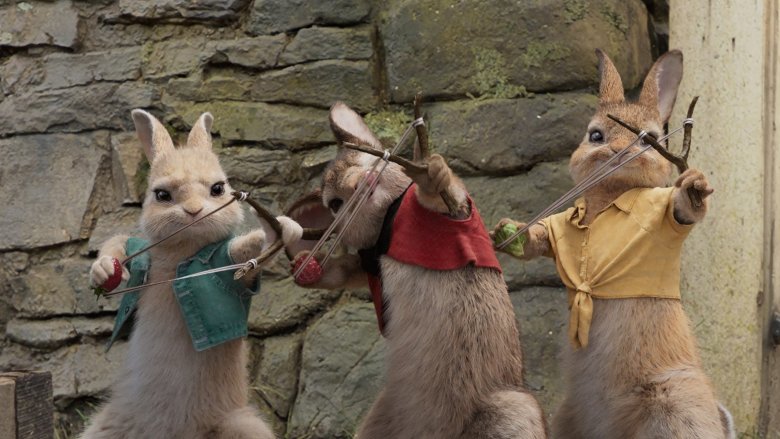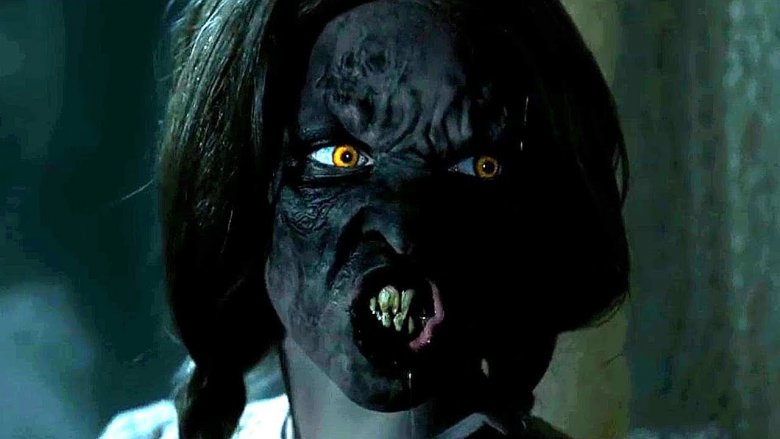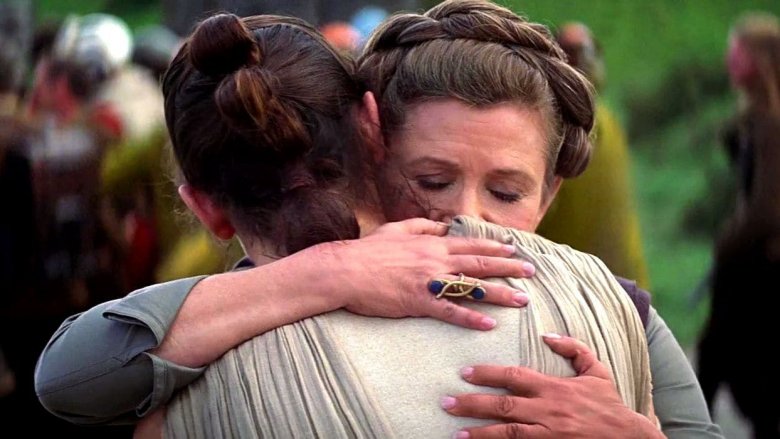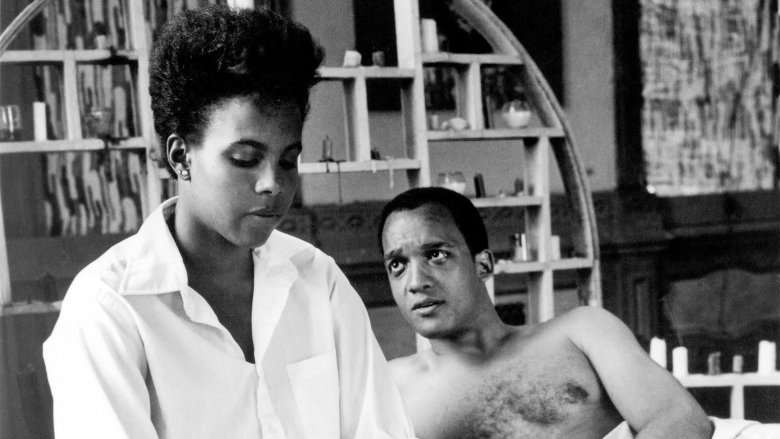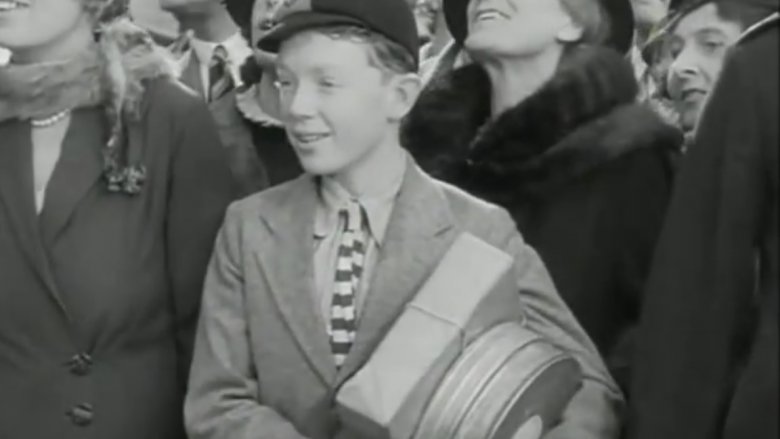Scenes That Directors Regret Shooting
Making a movie is a collaborative effort, but at the end of the day, the director is the one who's calling the shots. So it's sometimes tempting to see them as more than human, but really, they're just as flawed as any editor, screenwriter, or fan in the audience. And if they're just humans with their own faults and foibles, that means they're totally capable of screwing up a scene.
In fact, some of the greatest filmmakers in history cringe when they remember certain moments from their own movies. Perhaps they wish they could've gotten a different line delivery from an actor, maybe they feel bad about a particular camera shot, or perhaps they'd like to go back and restructure an entire sequence. Whatever the reason, filmmakers can definitely make mistakes, and there are more than a few scenes that directors totally regret shooting.
Spielberg should've kept the mothership a mystery
For better or worse, some filmmakers can't stop messing around with their movies, even after they've gone to theaters. George Lucas spent quite a bit of time tinkering with Star Wars, Ridley Scott has released several versions of Blade Runner, and James Cameron created multiple endings for The Abyss. Steven Spielberg famously swapped out some guns for walkie-talkies in E.T. the Extra-Terrestrial — which he later regretted — but even before then, he ruined a magical moment in Close Encounters of the Third Kind.
The original Close Encounters was a major success at the box office, but Spielberg wasn't happy with the finished product. He'd hoped to release the film in the summer of '78, but Columbia Pictures couldn't wait. The studio was in financial trouble, and they needed a big hit, so they released the film in December 1977. After the movie raked in the big bucks, Spielberg asked the studio if he could go back and finish Close Encounters, shooting some new stuff and re-cutting some existing scenes. Columbia gave him the okay, but with one caveat.
Hoping for an exciting angle to market the re-release, Columbia wanted Spielberg to film the inside of the mothership. (In the original film, we never see what's inside the UFO. Instead, we just see Richard Dreyfuss' awestruck expression as he peers into the starship.) Unfortunately, Spielberg "compromised" and the result was less than impressive; later, he admitted the new scene was a mistake, saying he never should've shown the interior because that "should've always been kept a mystery."
Raimi regrets those villainous vines
The Evil Dead is one of the great indie success stories. This scrappy little film was shot on a shoestring budget, and director Sam Raimi was forced to improvise all sorts of unorthodox ways to make it. Shooting was pretty intense, and the actors went through absolute hell, but it all paid off in the end when the movie turned Bruce Campbell into a B-movie star and launched Raimi's career. But while he owes a lot to those disgusting Deadites, Raimi actually does have one serious regret about his sophomore film.
In perhaps the movie's most infamous scene, a woman named Cheryl (Ellen Sandweiss) wanders out into the woods where she's raped by demonic trees. It's a pretty nasty scene, and during an interview on The Incredibly Strange Film Show five years later, Raimi admitted the sequence "was unnecessarily gratuitous and a little too brutal." He regretted upsetting people with a completely superfluous scene and went on to say, "My goal is not to offend people. It is to entertain, thrill, scare...make them laugh but not to offend them." Raimi took that lesson to heart, as the Evil Dead franchise lightened up after part one, evolving into a series that was more concerned with slapstick and good scares than pervy plants.
Meyer is sorry for making Spock a torturer
After the disappointing performance of Star Trek: The Motion Picture, director Nicholas Meyer came along and saved the franchise with The Wrath of Khan. He returned for The Voyage Home, which proved to be a whale of a good time, and then after The Final Frontier set a new low where no Star Trek film had gone before, Meyer came back and gave the Enterprise crew some of their dignity back with The Undiscovered Country. But while the film earned positive reviews and beat movies like JFK, Point Break, and Thelma & Louise at the box office, Meyer has a sour taste in his mouth when it comes to a rather sadistic scene involving everybody's favorite Vulcan.
In 2016, Meyer sat down with IGN and admitted he had a serious problem with the moment when Spock (Leonard Nimoy) performs the Vulcan mind meld on his Starfleet pupil, Valeris (Kim Cattrall). She's part of a plot to sabotage peace talks between the Klingons and the Federation, and Spock wants to know who else is involved. So he digs deep into her mind, forcing her to reveal her secrets, but as he goes further and further into her brain, Valeris begins to scream in pain. It's unsettling to see Spock hurt someone, and 25 years after the film, Meyer says the scene is too similar to "enhanced interrogation" of enemy combatants. As Meyer put it, the scene "sort of looks like waterboarding to me, and doesn't make me very happy to see it." Of course, if Meyer has trouble with his own Spock scene, we'd like to know what he thinks about Into Darkness.
Cameron regrets rewriting history
Most everyone loved Titanic when it originally came out, but this romantic disaster also stirred up quite a bit of controversy. Yeah, there was that stupid debate about whether or not Jack could fit on the door with Rose, but more importantly, there were some who thought Cameron took too many liberties with the historical narrative, especially when it came to the story of William McMaster Murdoch (played by Ewan Stewart).
Murdoch served as the First Officer aboard the RMS Titanic, but didn't make it back to shore. However, there's some debate surrounding his death. Some Titanic survivors claimed that an officer committed suicide on the ship, and some theorize it might've been Murdoch. While there's absolutely no proof Murdoch is the man who killed himself, Cameron decided to get creative with the facts. As he explained on National Geographic's Titanic: 20 Years Later with James Cameron, "I took the liberty of showing [Murdoch] shoot somebody and then shoot himself....We don't know he did that, but you know, the storyteller in me says, 'Oh.' I start connecting the dots. He was on duty, he's carrying all this burden with him, made him an interesting character."
Residents of Murdoch's hometown protested the scene, and Murdoch's nephew worried the film would ruin his ancestor's name. Instead of defending his choice, Cameron apologized, saying, "I wasn't thinking about being a historian, and I think I wasn't as sensitive about the fact that his family, his survivors, might feel offended by that, and they were." It goes to show that you've got to be careful when making a movie, even if you're the king of the world.
Coogler wishes he hadn't killed Klaue
You'd think that when it comes to Black Panther, Ryan Coogler wouldn't have any regrets. It's the most critically acclaimed film in the MCU, it's the ninth highest-grossing film of all time, and it was genuinely a landmark moment in the history of superhero movies. It's all especially impressive when you realize that Black Panther is only Coogler's third feature film. Still, according to The Toronto Sun, Coogler is pretty bummed out that he had to kill Ulysses Klaue (Andy Serkis), the most charismatic gunrunner who's ever sold a weapon of mass destruction.
"I like Klaue," Coogler said. "I was bugged by having to do that. It's tough when you have to kill characters off, and I really did love that character." Still, Klaue's death was 100 percent necessary to move the story forward, especially in a film crowded with so many fascinating characters. "I love Andy," he went on to say about the motion capture master. "He's a lovely person. But again, it's one of those things where when you've got so many people in a movie, some of them have to go."
Gluck says he's sorry for Scientology and blackberries
While he's not as famous as a lot of the directors on this list, chances are good you've seen at least one Will Gluck movie. He helped launch Emma Stone's career with Easy A, and he helped kill Cameron Diaz's with Annie. But while he only has six feature films to his name, Gluck already has at least two big regrets.
The first came after filming Friends with Benefits, the 2011 rom-com starring Justin Timberlake and Mila Kunis. During one scene, Timberlake makes a joke about Scientology, calling it "great science fiction," and in retrospect, Gluck feels pretty bad about the quip. Why? Well, the movie also stars Jenna Elfman, one of Hollywood's most prominent Scientologists.
"The way I work," Gluck explained to IndieWire, "I change the script a lot. While we're shooting, I'll yell out, 'Try this, try that!' We shot [the joke] once and then we left it in. But I feel really bad because I didn't tell Jenna about it, and then I forgot." So the first time Elfman heard the Scientology wisecrack was during the first screening, which was probably uncomfortable for everybody in the audience.
But that wasn't Gluck's only time apologizing for movie scene. After directing Peter Rabbit, Gluck found that moviegoers were hopping mad over a scene where the murderous rabbits prompt an allergic reaction in Mr. McGregor (Domhnall Gleeson) by attacking him with blackberries. The scene caused quite the uproar online, and the Asthma and Allergy Foundation of America even weighed in, condemning the sequence for making light of serious issue in a children's film. As a result, Gluck and Sony Picture formally apologized, saying that they were berry sorry.
Sandberg doesn't like his corny creature
Directed by David F. Sandberg, Annabelle: Creation fared a lot better than the original demon doll film, both critically and financially. But while the movie offered quite a few scares, like that sequence with the killer scarecrow or the nerve-wracking scene with the toy gun, there's one scene that Sandberg isn't so crazy about. On Reddit (via Screen Rant), he revealed that he has major problems with the sequence when an orphan named Janice (Talitha Bateman) comes face to face with a demon...one that feels like it escaped from a Sam Raimi movie.
During this eerie little moment, Janice finds the ghost of a girl who was killed in a car accident. Only when Janice gets closer to the dead kid, she finds out this "ghost" is actually an evil spirit, one with a freaky face and an appetite for human souls. Admittedly, the demon looks pretty goofy, and Sandberg knows it. As he put it, "Yeah, I never quite got that [scene] right, and I think of 'I'll swallow your soul' every time I see it." Sandberg then said that if he had a second chance, he would have the demon girl just whisper the line instead of going with the full-on Deadite voice.
Abrams is upset about that hug
While The Last Jedi split Star Wars fans down the middle, The Force Awakens was pretty much universally loved by audiences and critics alike. Sure, it took some criticism for being a bit too similar to A New Hope, but at the end of the day, the movie was a fantastic homage to the original trilogy — one that earned $2 billion at the box office. That much money means a lot of happy customers, although there is one scene that's bugged fans across the world. Why didn't Leia give Chewbacca a hug after Han Solo's death?
The much-discussed scene comes shortly after Kylo Ren (Adam Driver) plunges his lightsaber into Harrison Ford's stomach. Needless to say, Rey (Daisy Ridley) is pretty shaken to watch her newfound father figure get turned into a space kabob. So when she arrives at the Resistance base, General Leia (Carrie Fisher) comforts her with a big hug. That's all fine and good, only Chewbacca is standing right there. Chewie is Han's best friend, and Leia has known this Wookie for a really long time, so fans thought it was kind of weird that Leia would completely ignore her old pal for a girl she's never met before.
J.J. Abrams admits that it was a mistake on his part, but he also says he wasn't trying to snub Chewbacca. Talking with Slashfilm, Abrams explained it was simply a blocking issue. "Had Chewbacca not been where he was," Abrams said, "you probably wouldn't have thought of it. But because he was right there, passed by Leia, it felt almost like a slight, which was definitely not the intention." However, if you're looking for an in-universe explanation, Abrams says that Chewie was concerned about getting the injured Finn (John Boyega) to a hospital, so he was in too much of a hurry for a hug.
Lee wants a second chance on his first feature
As a guy who speaks truth to power, Spike Lee has a reputation as one of America's most controversial filmmakers. His most famous film, Do the Right Thing, provoked such a strong reaction that some (white) film critics feared it might actually start riots. (It didn't.) Lee has also drawn criticism for taking shots and trading barbs with celebrities like Clint Eastwood, Tyler Perry, and Charlton Heston. But as one of cinema's great provocateurs, Lee doesn't apologize all that often, so when he actually does regret something, you know he really means it.
So what is Spike Lee's "biggest regret"? In an interview with Deadline, the filmmaker confessed that he's truly appalled by the rape scene in She's Gotta Have It. This 1986 indie movie was a black-and-white story about a woman (Tracy Camilla Johns) involved with three different men. Eventually, one of those guys rapes our protagonist, and in a disturbing twist, she ends up wanting to be with the creep.
"If I was able to have any do-overs," Lee said, "that [rape scene] would be it. It was just totally...stupid." Lee admitted that he "made light of rape," and if he had the power, "that's the one thing" he would go back and change. Fortunately, Lee got a chance to redeem himself with the She's Gotta Have It Netflix series, where he dropped the rape scene entirely and approached the topic of sexual assault from a more mature perspective. So we guess you could say that Spike Lee did the right thing.
Not even Hitchcock can kill a kid
Alfred Hitchcock has long been hailed as the "Master of Suspense," but even a master can mess up. While he crafted some of cinema's most hair-raising moments — the shower scene from Psycho and the plane attack from North by Northwest, for example — Hitchcock always regretted a sequence from his 1936 film Sabotage. In this thriller, an anarchist-turned-terrorist (Oscar Homolka) hopes to bring London to its knees by bombing a parade in Piccadilly Circus. But instead of delivering the ticking time bomb himself, he gives the package to an unwitting boy (Desmond Tester) and has him do the dirty deed. The poor kid has no idea that he's carrying an explosive device, and Hitchcock ratchets up the tension as the unsuspecting kid climbs aboard a crowded bus.
Believe it or not, there's no last-minute rescue. The bomb explodes, killing everybody on the bus...even the boy. Hitchcock regretted the scene almost immediately. During his famous interview sessions with French filmmaker Francois Truffaut, Hitchcock said the whole sequence "was a grave error," and he agreed with Truffaut that killing a kid was "close to an abuse of cinematic power." In other words, it seems that Hitchcock sabotaged his own movie.
